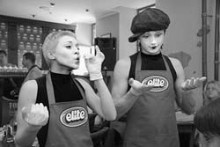Coffee is the most popular beverage in Ukraine. One can even describe coffee drinking as a lifestyle. But everyone has his own preferences. Coffee lovers are generally divided into four groups: gourmets, devotees of the coffee-making process, coffee addicts, and social coffee drinkers.
The first group recognizes only coffee made with freshly-ground beans; the second group frequents cafes; the third cannot live without caffeine; and the fourth group drinks coffee only to be sociable. The traditional culture of preparing and consuming this ancient beverage in our country is respected by only a small number of consumers. China cups are replaced by plastic ones, and poor quality is increasingly often compensated by quantity (3-5 cups a day are the norm). The Kaffa Coffee Theater recently tried to correct this shameful practice by staging a real celebration of coffee.
After donning carnival attire, the visitors felt a kinship with the world of real coffee. After passing the first initiation stage, we proceeded to master a huge machine called a roaster. A vivid demonstration of technological progress was carried out in accordance with all the traditional canons of filmmaking. A woman dressed in an African-style costume poured whole coffee beans from a wicker basket into the machine. The aroma of coffee quickly spread through the dimly lit hall, transporting us from Kyiv to distant Africa.
The rest happened in an atmosphere best described as intoxicatingly cheerful. To roast beans properly, they have to be constantly stirred. Through an aperture in the machine the expert tests the beans with a trier (a long narrow scoop) every few seconds. The roasting process is divided into several phases. The first one lasts 7-8 minutes, but the coffee turns out sour. If it is 9-11 minutes (full roast), the carbon dioxide gas that forms inside the beans “removes” the aromatic oils, and the coffee is too weak. After roasting for 12-13 minutes the coffee loses its sour taste and it tastes like hot chocolate. If quality Arabica beans are roasted this way, you get a full flavor. The important thing is not to overdo it. Otherwise the coffee will be tasteless.
Few can afford a professional coffee-making machine, so roasters are effectively replaced by the ever-popular frying pan. You can also buy roasted, ground coffee. It is important to know that it takes finely-ground beans to make good coffee at home. The aroma and taste penetrate the water more easily, which improves the quality of the beverage. If you prefer “natural” coffee and use a Turkish coffeemaker, you should make sure that it is made of the proper metal. Copper is best. Last but not least, the way the coffee looks is also important. Coffee beans are best kept in an airtight metal container. The air is pumped out and replaced by inert gas.
At the end of the coffee-making session the participants received various home recipes. The most interesting ones are listed below.
Viennese Coffee: Brew black coffee, top with a spoonful of cream whipped with icing sugar and vanilla. Sprinkle with grated chocolate.
Winter Coffee. Brew some strong coffee. Blend an egg yolk with honey in a glass and pour in the coffee.
Enjoy!







